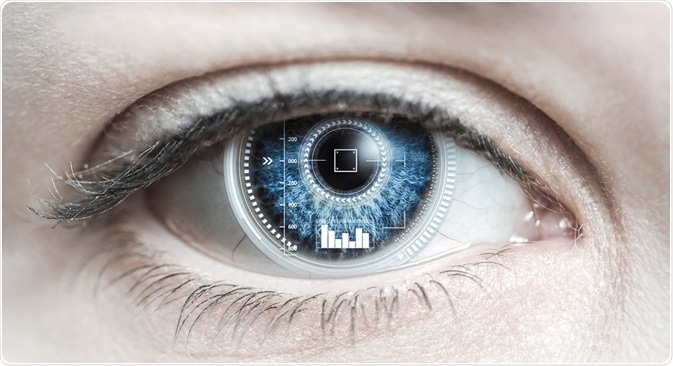Ophthalmology can involve many repetitive tasks, such as tonometry, biomicroscopy, and ophthalmoscopy. Deep learning AI devices can be used to perform these tasks with extremely high accuracy.
 Image Credit: Viktoria Gavrilina / Shutterstock
Image Credit: Viktoria Gavrilina / Shutterstock
What is artificial intelligence?
Artificial Intelligence (AI) is the property of intelligence (independent and/or creative problem-solving, induction and decision-making) demonstrated by machines.
AI systems can learn from the tasks performed to discover more efficient ways to achieve the goal. AI can be useful in many areas of medicine including ophthalmology.
Basics of artificial intelligence
A normal AI system can perceive its environment and take action to maximize the chance successfully completing the objectives or reaching the set goals.
A ‘goal’ can be either simple or complex. Goals are normally predefined, but depending on the AI they may also be induced, as is typically seen in reinforcement learning type AIs.
Some AI systems also use a fitness function to rate the success of the AI. This can be used to replicate high-scoring AIs with the aim of producing better-performing AI devices with each generation.
The AI device carries out its tasks in adherence to algorithms, which act as instructions. Algorithms are normally simple; even complex ones are composed of simpler algorithms.
The AI of the device will follow the algorithms and gather data which it uses to learn new strategies that will help it complete its task.
Different AI systems vary in how they tackle problems, learn, and perceive their environment. These systems can be used in different ways to achieve different results.
AI can be used in medicine to aid with diagnostics, drug development, treatments, patient monitoring, patient care, and personalized medicine.
History of artificial intelligence in medicine (AIM)
AI has been used in medicine since the 1970s. Researchers at the time discovered that AI could be of help in certain areas of life science research and medical practice.
The early AIM researchers had to overcome key problems with some AI methods, to ensure their applicability to science and medicine.
Their work led to the development of new AI methods that were more efficient for this purpose. Emerging methods included Internist-1, CASNET, and MYCIN.
By the early 1990s, two huge organizations were formed; the American Association for Artificial Intelligence (AAAI-M) and the Artificial Intelligence in Medicine Europe (AIME).
These two organizations hold conferences to discuss the current state of AIM and to offer predictions regarding AIM methods, with the aim of improving the methods.
Applications for artificial intelligence in ophthalmology
AI can be used to aid eye and vision care. Deep learning AI is used, for example, to test for diabetic retinopathy and has been proven to make accurate diagnoses that are on par with medical specialists.
This was achieved by introducing thousands of images of healthy and diseased eyes to an AI device. Gradually, AI figured out how to spot the condition without needing to be told what to look for.
I/O '18 Guide - Interview on AI in Ophthalmology
Prospects for artificial intelligence in ophthalmology
Current practices must be adapted to allow for the introduction of more AI-based methods and techniques into the field of ophthalmology.
This requires the healthcare professionals to re-evaluate the way they think in their practice and adopt an ‘out of the box’ approach to tackling future problems.
Many current researchers think that AI will be used as a tool to achieve better diagnosis and management of the disease.
As AIs can achieve automatic image recognition and neural networks can mimic the ‘trial and error’ learning process of humans, the efficiency of AI applications to healthcare is only expected to improve.
Although AIs will never be able to replace healthcare professionals or other methods that stand at the foundation of healthcare and ophthalmology, they can provide valuable inputs to increase the accuracy and personalization of diagnosis and treatment.
To conclude, AI can learn at incredible speeds. There are different types of AI available today for use, with deep learning and reinforcement learning being at the forefront of the methods used in the healthcare field.
The introduction of AI into ophthalmology will create more efficient techniques of patient diagnosis and management in many conditions.
Further Reading
Last Updated: Feb 27, 2019